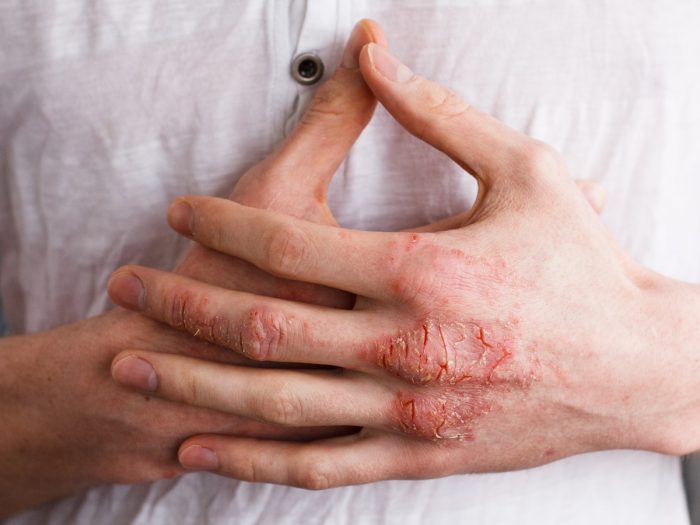Coconut Oil for Eczema
Coconut Oil For Eczema
You should use coconut oil for the treatment of eczema because it moisturizes the skin, helps to retain moisture, prevents infections from developing, speeds the healingprocess and boosts the immune response. In fact, this oil is considered to be one of the best natural options for reducing the severity of eczema, or eliminating it entirely.
Eczema occurs when the skin fails to create enough oil, which allows moisture to escape. Skin cells become dehydrated, and the space between them is the perfect breeding ground for various irritants, pollutants and pathogens, which quickly leads to flaky skin, irritation, itchiness, cracked skin, and unsightly inflammation. Coconut oil has a number of antibacterial, anti-fungal and antiviral effects that can protect the exposed areas of skin caused by the dehydration process. Furthermore, coconut oil is a natural moisturizer, so it can help the skin lock in the moisture it needs for proper function.
The active ingredients in coconut oil, such as vitamin E and K, as well as volatile organic acids, help to stimulate the regrowth of new cells and prevent the negative effects of free radicals and oxidative stress. As a whole, the effect of coconut oil on the skin is smoother, healthier and less irritated skin that is far less susceptible to future inflammation from eczema.

How To Use Coconut Oil For Eczema
You can use coconut oil in the form of a pure moisturizer, as a cleansing element in a warm bath, combined with other carrier oils, or prepared into a salve or cream. Coconut Oil Face masks are also quite popular for people wanting to clear up patches of eczema on their most visible areas.
Two of the most popular options are adding an entire cup of coconut oil to the bathtub and then allowing your entire body to soak up the benefits, or heating up a few tablespoons of the oil before mixing it with oatmeal and dumping it in the bath. These can provide full-body skin treatment, leaving you relaxed and rejuvenated!
As a pure moisturizer, this oil can be applied in a thin layer on any part of the body, but the most common areas for eczema are on the arms, legs, back and upper chest. Apply the oil three times each day, or apply before bed and wash thoroughly in the morning. Applying the oil directly after a bath is also quite effective, as your pores will be open and clean, making them even more receptive to the healing nutrients of the oil.
Coconut oil bandages, where a piece of gauze is wrapped around an area of the skin covered in coconut oil, are an excellent way to ensure that the oil remains in contact with the skin and does its job, even while you are moving throughout your day, or shifting while you sleep.
How To Use Coconut Oil To Cure Eczema In Babies
Babies often suffer from eczema, but by applying coconut oil after a bath, particularly in the joints, arms and legs, and carefully avoiding the eyes, the eczema symptoms can be mitigated or eliminated entirely. This is best done after organic oatmeal baths or other skin-soothing treatments. Leaving the small amount of oil on overnight can also be an effective choice.
What Type Of Coconut Oil Can Be Used For Eczema?
When treating eczema, always choose unrefined, virgin organic coconut oil. This will be the purest form available, before many of the other nutrients and volatile components are lost through processing. If you want to benefit from the full strength of the volatile and medium-chain fatty acids found in this remedy, spend a bit more money on this 100% pure form of the oil.
Time It Takes To Cure Eczema With Coconut Oil
With daily application, most people see an improvement in eczema symptoms within a few days to a week, particularly if flare-ups are not common. For people who suffer from chronic eczema, it may take slightly longer to get the symptoms under control, perhaps a month or more. Consistency is key if you want to completely rid yourself of eczema.
However, many people use coconut oil on their skin every day as a protective shield against skin conditions like eczema, psoriasis and acne, and it has proven to be an excellent preventative measure.
- http://journals.lww.com/dermatitis/Abstract/2008/11000/Novel_Antibacterial_and_Emollient_Effects_of.3.aspx
- http://journals.sagepub.com/doi/abs/10.1177/1091581811400636
- http://web.a.ebscohost.com/abstract?direct=true&profile=ehost&scope=site&authtype=crawler&jrnl=09694900&AN=62605153&h=kr8sRtuDpiJ4a9IbaVi%2bpTJrg5OTvM1nyPYnavd1lOM5QRHwqRp6wFDV1bKijwvkn0bjOAThN6KmDGugeCBALg%3d%3d&crl=c&resultNs=AdminWebAuth&resultLocal=ErrCrlNotAuth&crlhashurl=login.aspx%3fdirect%3dtrue%26profile%3dehost%26scope%3dsite%26authtype%3dcrawler%26jrnl%3d09694900%26AN%3d62605153
- http://journals.rcni.com/doi/abs/10.7748/ns.9.44.25.s40?journalCode=ns
- http://www.sciencedirect.com/science/article/pii/S0738081X1730055X
Comments
Post a Comment